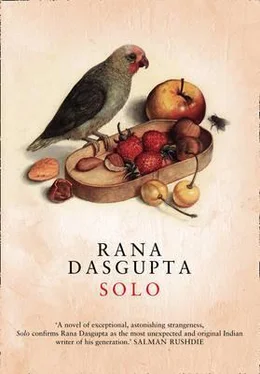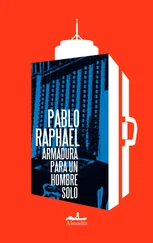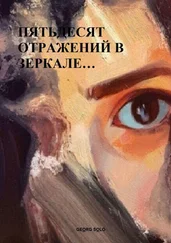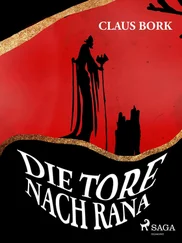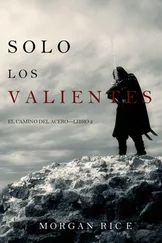He forces words into the microphone, and his own voice is stolen too.
‘I spent a decade in an abandoned town, alone with the animals. Everyone should try it.’
The audience laughs, and he is stupefied by the scale, cameras spinning over his head. The many images of Boris turn their eyes upon the multitude.
‘I’m not joking,’ he says.
The cackling gallery gives way to clapping, and his music thunders again. He is led off stage, and with all the video screens it is like a hall of mirrors finding a way back.
‘No! Come back! We must have Boris!’
The man and woman who stand for the cameras either side of Boris possess two of the most well-known faces in the world, but he does not recognise them. He is bent over, laughing in the flashes, the woman’s bare arm brushing his cheek, the journalists shouting.
‘Boris! Take off your glasses!’
Irakli stands by, watching. He has become entirely invisible. He stands under the blazing lamps, and still people try to walk through him.
Plastic and Khatuna are standing near by. Khatuna wears dark make-up and has drawn silver lightning flashes on her cheeks. A journalist wants a comment from Plastic.
‘Is it true the American music industry is being taken over by eastern European gangs?’
Plastic is smiling for the cameras. He says,
‘That’s an insane question. Who gave you an idea like that?’
Security men are trying to protect the demigods who walk here so close to mortals. The love they inspire is so consuming that ordinary people cannot keep themselves from throwing themselves at them and ruining their hair. As they pass through the doors into the evening, humans line up along the immortal corridor and scream with the pain of adoration. Khatuna walks down the carpet on Plastic’s arm, looking at the goggling, afflicted faces, and wonders again how American youths can get so fat.
Boris leaves a cosmic shower behind him, as the camera flashes fade.
‘Where’s your girlfriend, Boris?’ shouts a photographer.
Boris is full of witty remarks. His hands are full of trophies. He is handsome and magnetic, and Irakli is entirely inconspicuous by his side. He looks at the way Boris holds himself and realises there are parts of his friend he will never know.
The four of them get into the same limo. The car doors shut and they can hear their voices again. Boris seizes the champagne with relish, and pours four glasses. Khatuna drinks hers straight down and grabs the bottle.
‘Are you OK, Irakli?’ asks Boris. ‘You’re very quiet.’
Irakli nods, and forces a smile.
Plastic’s face radiates gladness. He locks an elbow around Boris’s neck and kisses the top of his head.
‘That’s my boy!’ he shouts. ‘My genius boy!’
Plastic and Boris exchange tributes, and Khatuna gets increasingly impatient. There’s a line of limousines blocking the street, and theirs has hardly moved.
‘How far is this party?’ she asks irritatedly.
‘It’s in that building.’ Plastic points about a hundred metres down the road.
They are motionless in the traffic. Irakli’s face is turned towards the crowds outside, and Boris plays a snatch of music on his violin, though there is hardly space to move a bow. It’s a tune from his album, and he hams it up, crossing his eyes and playing like an idiot. Khatuna can’t stand it, and she shouts over the music at him,
‘Is it true you’re dating that actress?’
She manages to make it sound like an insult. Boris says,
‘I hate that word. Are we calendars?’
‘Jerk,’ she says.
Boris puts his window down, and hangs his arm outside the car. His violin is lying in his lap.
Khatuna says,
‘You’re losing your hair. I can see it in this light. You’ll be bald by the time you’re thirty.’
Plastic glares, trying to rein it in.
Suddenly Khatuna seizes the violin from Boris’s lap and begins to whack it against the window ledge. Plastic tries to save the instrument but she roars like an animal and her strength is unexpected. She smashes the violin three times, and it is entirely destroyed, only the strings holding the pieces together. She tosses the carcass through the open window.
It is Plastic who turns on her, hits her in the mouth and shouts obscenities. She laughs in his face, and touches her finger to her bleeding lip. A glass is broken, and there is champagne down Plastic’s suit.
Boris turns up at the party with nothing in his hands. Smiling moguls put their arms around him and lead him to the right people.
Irakli stands on his own, watching. The room is full of faces he has seen every day on television. Pop stars and movie stars are serving up smiles, and using gestures they have prepared beforehand. They are stealing glances at each other’s clothes. They fawn and are fawned upon: everyone loves everyone, but it is not the love of humans.
The most famous woman in the world is here, a woman so impossibly celebrated and beautiful that she must sit in her own private corner behind a velvet rope, surrounded by young men selected for their looks and their ability to keep talking.
Previously, at home, Irakli has watched some of these people with rapt attention, his pupils wide. If he has ever speculated about being in a room with them, he has probably imagined his emotions in a heightened state. But here he is excessively bored. Waiters are passing with cocktails and he takes them two at a time, and still he is unable to lose himself. The banality is strangely devastating.
Plastic and Khatuna are off among the crowds, sparking with their rancour. A bruise is coming up on Khatuna’s cheek, and she seems to be showing it off. Plastic is trying to be charismatic, but the strain is showing, and it’s noticeable that people walk away from his conversation.
The most famous woman in the world sends a message to Boris, inviting him to join her in her private corner, for she is not above the fascination of ordinary people. Boris sits down next to her and she asks him questions about himself. She says,
‘You’re quite a normal size. I imagined you would be big.’
Boris laughs. ‘People are getting smaller. Haven’t you noticed?’
He becomes restless during their conversation. He does not want to talk. While she is asking how he feels about the great number of his awards, he takes her cool hand under the table and positions it firmly on his penis.
The most famous woman in the world does not remove her hand. She looks him in the eye and says,
‘You’ll have to excuse me. I’m a vegetarian.’
Boris matches her gaze. He is enjoying himself. He says, obscurely,
‘I’ve heard of vegetarians. Don’t they lose their talents young?’
Irakli is on his own. He listens to conversations about the sensational hookers who have come into town for this night. He cannot get close to his friend, who is cocooned in the corner, and he decides to get up and dance. He spills his drink over his clothes, and curses. He starts to move to the music, and he knows he is very bad: he cannot hear the rhythm or master his body. He bumps into somebody, who turns round, complaining and indignant. Eventually Irakli leaves. A camera flashes as he comes out of the door, the photographer like a jumpy sniper realising too late that the person coming out is no one.
Irakli walks back to the hotel and takes the elevator to the twenty-first floor. His room has been altered in his absence, the signs of his existence removed. They have folded back the corner of the bed-covers, and put away his things. There is a promotional package from Universal Records on the table. He takes out Boris’s CD and looks at it again.
He looks at himself in the mirror. Turquoise half-moons are buried under his eyes. It is true that he has become difficult to see.
Читать дальше
Конец ознакомительного отрывка
Купить книгу
